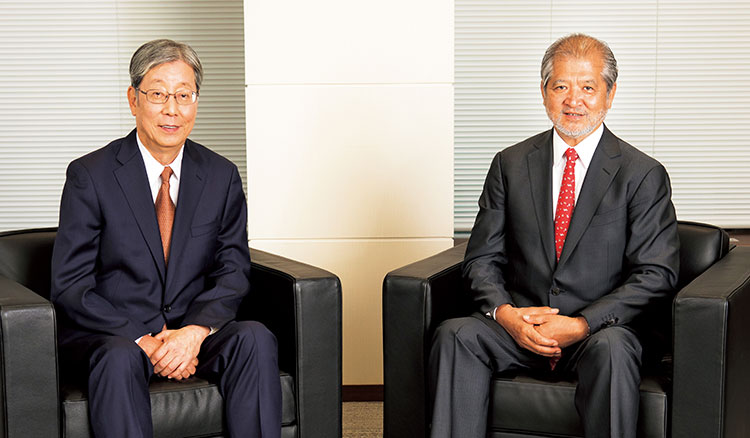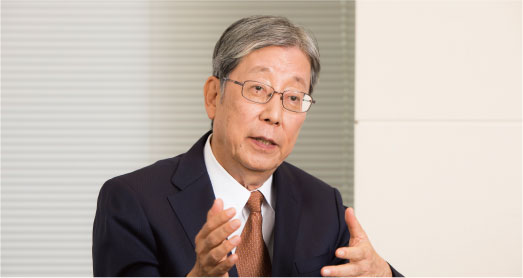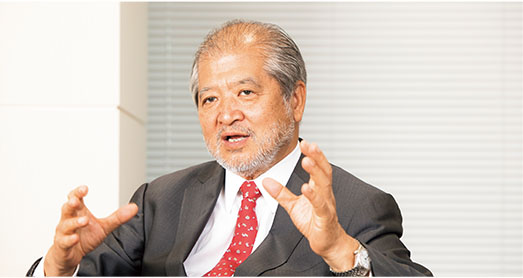

Dialogue Between Outside Directors
Improving the efficacy
of the Board of Directors
with a view to realize
sustainable growth
Left: Shinjiro Iwata
Outside Director and Chairman of the Board of Directors
Profile
After joining Hitachi, Ltd., in 1972, Mr. Iwata served as CEO of Hitachi Data Systems Corporation, executive vice president of Hitachi Global Storage Technologies, Inc., and representative executive officer and executive vice president of Hitachi, Ltd. He has served as an outside director at Benesse Holdings since 2014 and is currently the chairman of the Board of Directors.
Close
Right: Ryuji Yasuda
Outside Director
Profile
Mr. Yasuda joined McKinsey & Company, Inc. Japan, in 1979, after which he served as a general manager of A.T. Kearney, Inc. In 2004, he became a professor at Hitotsubashi University’s Graduate School of International Corporate Strategy (currently the Department of International Corporate Strategy in the Graduate School of Business Administration). Since 2015, he has been an adjunct professor at the school while serving as an outside director of Benesse Holdings.
Close
- Increasing opportunities for dialogue with outside directors leads to a more effective Board of Directors
- Information sharing and training create a firm basis for deliberations by the Board of Directors
- Evolving discussions concerning the Board’s diversity and succession planning
- Tackling issues with a long-term perspective amid major changes in the operating environment
Increasing opportunities for dialogue with outside directors leads to a more effective Board of Directors
- Iwata
- Compared with 2014, when I was appointed as an outside director, the way the Board of Directors operates and the content of our deliberations have changed considerably. When I first joined the Board, our meetings lasted about one to one and a half hours, and sometimes discussions were not very substantive. More recently, however, members of the Board are much keener to listen to the ideas of the outside directors and apply them in management.
- Yasuda
- I joined the Board one year later in 2015, and since that time, preparatory meetings have been held in advance of board meetings, giving us opportunities to discuss various issues. At the same time, the company’s expectations for outside directors changed. In Board meetings, the president has been opening up the floor for discussion after making his usual opening remarks. He has been listening to the viewpoints of outside directors along with the input of board members who are directly involved in operations, which has initiated a dialogue of ideas from both inside and outside the company. It seems like the president has been trying to raise the efficacy of the Board of Directors by encouraging all of its members to contribute a wide range of views and debate openly while explaining their objectives.
- Iwata
- I used to think a lot about how to encourage the outside directors to participate more in discussions, but now they offer many ideas, so I never worry about that anymore. I imagine that the outside directors feel at ease about participating more because the chairman, myself in this case, is also from outside the company.
- Yasuda
- As the chairman of the Board, you take on the role of a company chairman who is not involved in business execution. You also place importance on having outside directors engage in dialogue with the president and executive officers. I believe that having many opportunities for such dialogue will lead to a more effective Board of Directors.
- Iwata
- I agree, but if we look at the results of our annual evaluation of the Board’s effectiveness, improvements were made up to FY2017, and then the results leveled off in FY2018. I think the results reflect the initial awareness among board members of the need to improve. If I am right about that, in retrospect, perhaps we should have set new goals for improvement and raised the bar even higher.
- Yasuda
- Another reason is that the Board of Directors deliberated on many big issues three or four years ago, like strengthening the compliance system, restructuring core businesses to boost earnings, and monitoring the company’s financial condition. Because improvements were made and everything has been getting back on track, input from outside directors has, in fact, decreased a little since then. Nevertheless, I hope that we outside directors offer even more ideas than before about the Benesse Group’s future.
Information sharing and training create a firm basis for deliberations by the Board of Directors
- Iwata
- Outside directors now receive more information than in the past, especially in meetings held in advance of board meetings. We also regularly participate in various events and gatherings in order to get an inside look at the Group’s businesses.
- Yasuda
- I have visited workplaces of all of the Group’s businesses a number of times, and, as you would expect, I can learn more from talking with people in those workplaces than I do from listening to a presentation in the board room.
- Iwata
- What impressed me most recently was an initiative in the nursing care business. It has developed a method for caring for people with dementia and other illnesses based on best practices compiled from around 300 nursing homes. The head of this business is now talking about making this method open to the industry, saying that Benesse can raise standards in the entire nursing care industry while also taking the lead. I was very impressed by that level of confidence and determination.
- Yasuda
- Employees in the nursing care business are very motivated, indeed. They independently decide on projects to pursue and set up workshops to exchange ideas and share expertise. That demonstrates the powerful sense of mission they have to help people. I think the same is true for employees involved in the correspondence and classroom courses of the education business. The strong dedication they have to their work is very evident in their workplaces. Over the years, I have always said that Benesse’s greatest strength is its human resources. Realizing the capabilities of human resources, however, is not just about assembling people with skills; passion is what drives those capabilities, and Benesse has many passionate employees.
- Iwata
- Officer study sessions provide a means of providing information to outside directors. They follow board meetings, and include a presentation by the officer in charge of a business or ongoing initiative. Requests from directors concerning matters they want to know more about, the feasibility of particular measures, and so on are drawn up based on board meeting minutes. Then responses to those requests are prepared for the study sessions. This procedure is a unique feature of the company’s corporate governance.
- Yasuda
- It is important that we do not simply adopt externally developed systems based on Japan’s Corporate Governance Code. Moreover, we cannot really get a true sense of a company’s workings just by reading documents in the boardroom. In other words, the meetings with executives are an excellent means of getting the information we need.

Evolving discussions concerning the Board’s diversity and succession planning
- Iwata
- The five outside directors currently serving on the Board each come from different professional backgrounds, and I think this creates a good balance. Going forward, however, it will be necessary to invite new outside directors to the Board, so we should begin discussing what kind of background and experience we would like them to have.
- Yasuda
- For Benesse Holdings, the composition of the Board of Directors should not only be based on the diversity of the outside directors’ specialties, but also on the company’s long-term strategies. That will mean appointing people who have international business experience and solid expertise in digital technology. Women should also be appointed as directors, as the company did this year.
- Iwata
- Someone with global business experience, such as a former CEO of an American company, for instance, could bring a completely different dynamic to the Board. In some respects, Westerners have very different approaches to work and personal life than Japanese, but if Benesse is going to successfully compete globally in the future, I think it will be necessary to gradually incorporate elements of such approaches.
- Yasuda
- Succession planning will also be important for the company’s future, and the Nomination and Remuneration Committee has been leading discussions on appointing the president’s successor and grooming the next generation of inside directors.
- Iwata
- As you know, a leadership grooming program is being considered and candidates are being interviewed. From this year, all outside directors will serve as members of the Nomination and Remuneration Committee, so I expect more discussions of these issues than in the past.
- Yasuda
- The Board of Directors is also comprised of inside directors, so it will be a little tricky to determine how much of the deliberations by the Nomination and Remuneration Committee can be reported to it. Nevertheless, the company is certainly taking succession planning more seriously, and is also operating programs for training new leaders, such as the Benesse University program.
- Iwata
- Along with that, I believe the Board of Directors should engage in more discussions about how to use capital. Up to now, procuring capital has not been a major issue because the company receives admission fees from new enrollees of correspondence courses every April, and then uses that cash over the year. When the number of enrollees goes down due to Japan’s low birthrate, however, it will be necessary to determine how to procure and use capital for incorporating digital technology and establishing a new business as the Group’s third pillar after the education and nursing care businesses.
- Yasuda
- Asset replacement is an obvious means of ensuring sustainable growth. While enhancing businesses that are already strong, replacing businesses that no longer generate synergies and investing in new products and services for which demand is high are essential strategies for realizing growth. Mergers and acquisitions are being considered as ways for establishing a third pillar, so we can expect them to be discussed by the Board in the future.

Tackling issues with a long-term perspective amid major changes in the operating environment
- Iwata
- If we consider the Benesse Group’s operating environment, the markets for correspondence courses and school support services are shrinking due to the country’s declining population. Consequently, improving capital efficiency will become increasingly important in the future, and launching new businesses will be essential. As these trends play out, I believe the Board must debate on the future direction of the Group over the next five and ten years.
- Yasuda
- I completely agree. The education market is contracting and, despite full enrollment at Japanese universities, the quality of education in Japan appears to be lagging behind other countries. At a time when major educational reforms will be needed in Japan, I think Benesse should rise up to the challenge of envisioning how it can contribute with an even longer term perspective. The company is well positioned to do that because it has a very clear raison d’etre as an education and nursing care provider. Therefore, even if society changes, it should be obvious how to decide on what needs to be done and what mission to pursue next. For example, now that Japan is dealing with a rapidly aging population, Benesse should be able to offer more services related to nursing care, so we need to consider how to shift the company’s human resources in that direction.
- Iwata
- That’s right, because improving education and helping the elderly live comfortably and securely will continue to be challenges for generations to come. Recurrent education could provide a way to bridge those challenges and meet growing demand in the future. By responding to such wide-ranging issues and needs of people and their communities, Benesse should be able to create new businesses. As an outside director, I hope to help the company take on such challenges in the future.
Last updated : 2019/10/09
- Top
- Invester Relations
- Benesse Integrated Report 2019
- Dialogue Between Outside Directors